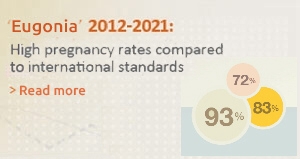We have published the largest study in the literature for women with PCOS undergoing IVF. Our results show that the GnRH antagonist protocol is associated with a significantly lower incidence of OHSS compared to the long protocol, while maintaining high pregnancy rates. Therefore, the antagonist protocol can be the protocol of choice for PCOS women undergoing IVF.
Flexible GnRH antagonist protocol versus GnRH agonist long protocol in patients with polycystic ovary syndrome treated for IVF: a prospective RCT. Trifon G Lainas, Ioannis A Sfontouris, Ioannis Z Zorzovilis, George K Petsas, George T Lainas, Efthymia Alexopoulou, Efstratios M Kolibianakis Human Reproduction, 2010, Vol 25, No 3, pp. 683-689 See the publication
In another study of our team, we used a different antagonist protocol (D1), which was also associated with a lower chance of OHDD development. The study included women with PCOS and compared the long protocol with an antagonist protocol in which antagonist was initiated on day 1 of ovarian stimulation, instead of day 6.
Initiation of GnRH antagonist on Day 1 of stimulation as compared to the long agonist protocol in PCOS patients. A randomized controlled trial: effect on hormonal levels and follicular development. Lainas TG, Petsas GK, Zorzovilis IZ, Iliadis GS, Lainas GT, Cazlaris HE, Kolibianakis EM Human Reproduction, 2007, Vol. 22, No 6, pp. 1540-1546 See the publication
We also use methylprednisolone for the prevention of OHSS in high risk patients. Using this method we successfully treated all cases of OHSS at an outpatient level. Patients with severe OHSS who were hospitalized were very few.
Administration of Methylprednizolone to prevent severe ovarian hyperstimulation syndrome in patients undergoing in vitro fertilization. T. Lainas et al., Fertil. Steril. 2002;78(3):529-533). See the publication






























